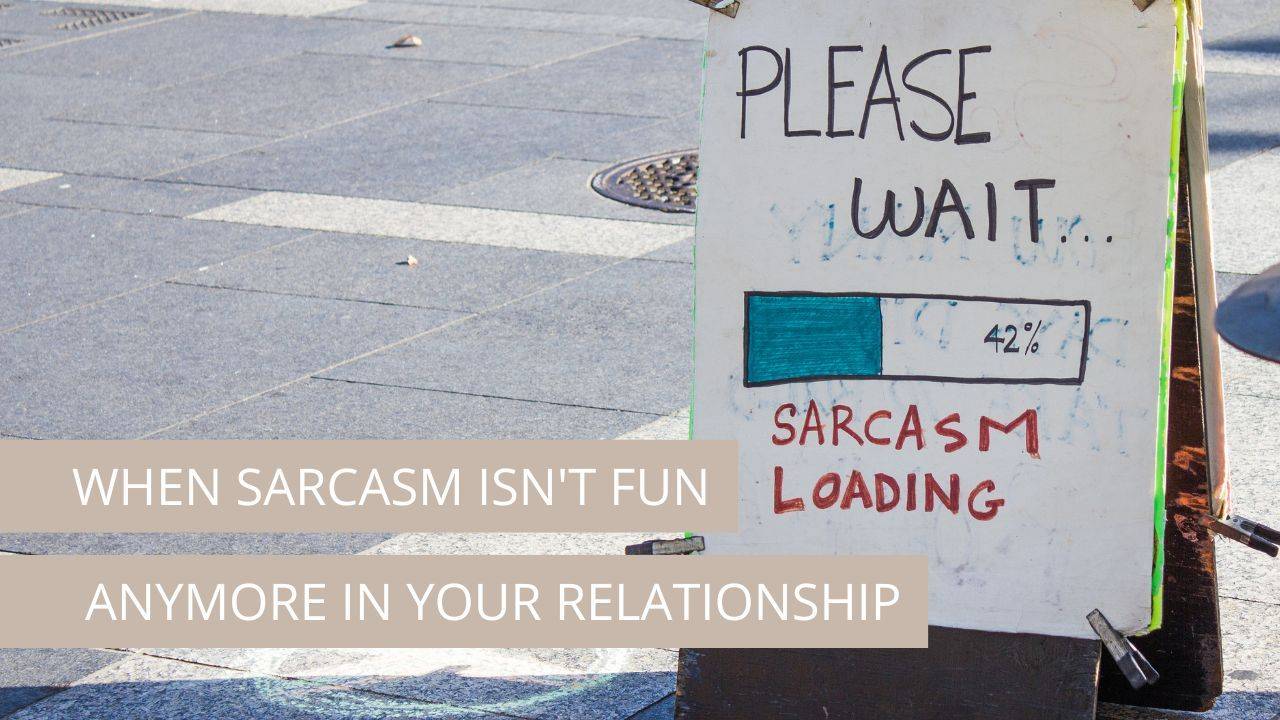When sarcasm isn't fun anymore in your relationship
Jun 12, 2023
I grew up in a country town and it was normal to mock, make fun of or turn anything into a joke. If you stacked it (fell off your bike) people would laugh and then make absurd comments like, "Didn't you see that rock, mate" I was a super sensitive kid, and knew that I totally missed the rock but I was hurt and desperately wanted to feel safe and supported. Instead, I was met with "brush it off, you'll be right, happens to the best of us" etc.
Sarcasm was in each and every day, I learned how to be sarcastic, and to use my quick wit but it also came with side effects. Today I want to expand on how sarcasm can cause tension in a relationship. Now, some of us use sarcasm to lighten the mood, it helps us to share our feelings, and it's a tool for communication (a style).
As I've grown older, I don't mind a bit of sarcasm in fun and games with another human, but never to tear anyone down etc. It's used when both me and the other person are in the same mood and know how to use it to make each other laugh.
The side effects of not using sarcasm well not only affect us it also leaves the other person guessing. You see when I was being a smart-ass, as they say when at school, I said something to someone in the class, I remember everyone laughing loud at my statement. However, it wasn't supposed to be that way, my remark was supposed to get under my teacher's skin not the person I used as a decoy. I felt awful because my wit was lost in translation. The joke was on the person and not at all on the teacher. Obviously, I lost a friend that day. I wish the details were clearer but the feeling is what made me realise that sarcasm wasn't for me, especially as a weapon.
Why do people use sarcasm?
Firstly there are a few reasons as I mentioned above, people use it for fun, humour and playfulness, it's their communication style and helps them to express themselves, meanwhile, others use it to vent frustration and it can also be a defence mechanism. These two later ones we will go into deeper.
- Venting Frustration: Sarcasm can serve as an outlet for expressing frustration or disapproval without resorting to direct confrontation or hurtful language. When someone feels upset or irritated about a particular issue, sarcasm allows them to communicate their discontent in a seemingly light-hearted or witty manner.
By using sarcasm, individuals may try to soften the impact of their frustration, making it more palatable or less aggressive. It can be a way to draw attention to an issue or behaviour that bothers them while still maintaining a level of distance or detachment. Sarcasm provides an indirect way to express negative emotions and allows individuals to avoid direct conflict or uncomfortable confrontations.
However, it's important to note that sarcasm is not always the most effective or healthy approach to addressing frustrations in a relationship. Over-reliance on sarcasm or persistent use of it can lead to misunderstandings, hurt feelings, or the suppression of important issues that need to be addressed more directly.
- Defence Mechanism: Sarcasm can also be used as a defence mechanism in certain situations. When someone feels criticized, attacked, or vulnerable, they may employ sarcasm as a way to deflect or protect themselves. By responding sarcastically, individuals create a shield or barrier, using humour or irony to sidestep direct engagement with the criticism or vulnerability.
In this context, sarcasm can be seen as a self-protective mechanism. It allows individuals to distance themselves from potentially hurtful situations or to assert a sense of control over their emotions. By responding sarcastically, they may feel they are maintaining their composure or not letting others see their true emotional state.
However, it's important to recognize that sarcasm used as a defence mechanism may hinder open and honest communication. It can create a barrier between individuals, preventing genuine emotional connection and understanding. Overusing sarcasm as a defence mechanism may also prevent personal growth and self-reflection, as it can become a way to avoid addressing underlying issues or working through emotional challenges.
While sarcasm can be used as a means to vent frustration or as a defence mechanism in relationships, it's crucial to strike a balance. It should not be the primary mode of communication, as it can hinder open dialogue, lead to misunderstandings, and prevent the healthy resolution of conflicts. Clear and direct communication, combined with empathy and understanding, is essential for fostering a strong and healthy relationship.
Why using sarcasm isn't for everyone
1. Misinterpretation: Sarcasm heavily relies on tone, context, and delivery to convey its intended meaning. However, these cues can be easily misinterpreted or misunderstood, leading to confusion or hurt feelings. When sarcasm is not clearly understood, it can create tension or strain in a conversation.
2. Emotional Impact: Sarcasm can sometimes be perceived as mocking or belittling, even if not intended that way. The use of sarcastic remarks can hurt or offend others, particularly if they are sensitive or unaware of the speaker's intention. The underlying message or criticism in sarcasm can be received as passive-aggressive or mean-spirited, damaging relationships and causing emotional distress.
3. Lack of Authenticity: Sarcasm can create a sense of distance or detachment between individuals. When sarcasm becomes the primary mode of communication, it may prevent genuine emotional connections or authentic expressions of thoughts and feelings. Some people may prefer more direct and sincere forms of communication to foster deeper connections.
4. Cultural Differences: The perception and acceptance of sarcasm can vary across cultures. In some cultures, sarcasm may be less common or even considered impolite or disrespectful. When people from different cultural backgrounds interact, the use of sarcasm can lead to misunderstandings or cultural clashes.
5. Previous Negative Experiences: People may have had negative experiences with sarcasm in the past, such as being the target of hurtful or derogatory sarcastic remarks. These experiences can shape their aversion to sarcasm and make them more sensitive to its use.
6. Incompatibility of Communication Styles: Different individuals have varying communication preferences and styles. Some may prefer straightforward and direct communication, while others may enjoy playful banter. If there is a mismatch in communication styles, the use of sarcasm may create discomfort or friction.
It's important to note that not everyone dislikes sarcasm, and some individuals enjoy its use in appropriate contexts. However, it's essential to be mindful of others' preferences and be sensitive to their reactions. Adjusting one's communication style and finding common ground in how to engage in conversations can foster better understanding and smoother interactions.
How to deal with sarcasm in your relationship
If sarcasm in your relationship is no longer enjoyable and has become problematic, it's important to address the issue and find a resolution. Here are a few steps you can take:
1. Reflect on your feelings: Take some time to consider how the sarcasm is affecting you. Are you feeling hurt, misunderstood, or frustrated? Understanding your own emotions will help you communicate more effectively.
2. Communicate openly: Initiate a calm and honest conversation with your partner about how you feel regarding the sarcasm. Explain how it is impacting you and why it has stopped being enjoyable. Use "I" statements to express your feelings without sounding accusatory. For example, say, "I feel hurt when sarcasm is used frequently because it makes me question if you mean what you say."
3. Share specific examples: Provide specific instances where the sarcasm has had a negative impact. By highlighting particular situations, you can help your partner understand the consequences of their words and actions.
4. Discuss intentions and boundaries: Talk about the intentions behind the use of sarcasm in your relationship. Clarify if it was intended to be playful, affectionate, or used as a defence mechanism. Establish clear boundaries regarding what is acceptable and what is not. Work together to find alternative ways of expressing humour or addressing frustrations that are more respectful and supportive.
5. Seek compromise: Find a middle ground that respects both your needs and your partner's communication style. This may involve reducing the use of sarcasm, establishing agreed-upon cues or signals to indicate when sarcasm is crossing a line, or exploring alternative forms of humour that are more mutually enjoyable.
Remember, open and respectful communication is crucial in any relationship. If sarcasm is causing distress or negatively impacting your connection, addressing it directly and finding a resolution together can help strengthen your bond.
---
Sarcasm can have a heavy impact on one's emotional well-being especially if there are feelings of disconnect between the two people. When conversation is spiked constantly with sarcasm one doesn't fully understand the truth behind the words. Are we for real or are we being lied to? Healthy relationships rely on clear communication between each person and to take the guesswork out of what things mean.
Want a little help, get your hands on my Boundary Builder Bundle and turn your story around.



















